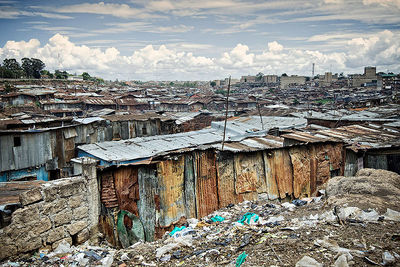imported>Chunbum Park |
imported>John Stephenson |
| (24 intermediate revisions by 4 users not shown) |
| Line 1: |
Line 1: |
| == '''[[Malthusianism]]''' ==
| | {{:{{FeaturedArticleTitle}}}} |
| ----
| | <small> |
| '''Malthusianism''' is a theory in [[demography]] regarding population growth. It holds that population expands faster than food supplies. Famine will result unless steps are taken to reduce population growth.
| | ==Footnotes== |
| ===Pre-Malthus notions===
| |
| Over the centuries many theorists have considered one or another aspect of population,<ref name=strane1904>Charles Emil Stangeland. (1904, 1955, 1966) ''Pre-Malthusian Doctrines of Population: A Study in the History of Economic Theory''. Augustus M (1955). | A history of population theories. | [http://www.amazon.com/PRE-MALTHUSIAN-DOCTRINES-POPULATION-HISTwORY-ECONOMIC/dp/B00APO8AFI/ref=sr_1_1?s=books&ie=UTF8&qid=1375128619&sr=1-1 Amazon].</ref> usually to promote the policy of more people (“pronatalist.”) The early Christian tradition, however, was “antinatalist”, with the highest prestige going to priests, monks and nuns who were celibate.
| |
| | |
| In the 17th and 18th century the general belief, called "[[mercantilism]]" was that the larger the population the better for the nation. Larger population meant more farmers and more food, more people in church (and more prayers), and larger, more powerful armies for deterrence, defense and expansion. People equaled power. As [[Frederick the Great]] of Prussia put it, "The number of the people makes the wealth of states." The policy implications were clear: the state should help raise population through annexation of territory and pronatalist subsidies that encourage large families. After 1800, a rising spirit of nationalism called out for more people to make a bigger and more powerful nation.
| |
| | |
| ===Malthus===
| |
| English writer Reverend [[Thomas Malthus]] (1766-1834), in the first edition (1798) of his pamphlet, "An Essay on the Principle of Population" turned the received wisdom upside down. His stunning conclusion was that more people might make it worse for everyone--that overpopulation was bad and unless proper steps were taken, disaster was inevitable.<ref name=mal1798>Malthus TR. (1798) [http://www.gutenberg.org/catalog/world/readfile?fk_files=3275431 An Essay on the Principle of Population by T. R. Malthus]. Produced by Charles Aldarondo. HTML version by Al Haines. | Title links to full-text online.</ref> Population growth was exceedingly dangerous, he warned, for it threatened overpopulation and soon we would all starve to death. The British were taking over India at this time, and could see first-hand the horrors associated with overpopulation.
| |
| | |
| | |
| ''[[Malthusianism|.... (read more)]]''
| |
| | |
| {| class="wikitable collapsible collapsed" style="width: 90%; float: center; margin: 0.5em 1em 0.8em 0px;"
| |
| |-
| |
| ! style="text-align: center;" | [[Malthusianism#Notes|notes]]
| |
| |-
| |
| |
| |
| {{reflist|2}} | | {{reflist|2}} |
| |}
| | </small> |
Latest revision as of 09:19, 11 September 2020

The Mathare Valley slum near Nairobi, Kenya, in 2009.
Poverty is deprivation based on lack of material resources. The concept is value-based and political. Hence its definition, causes and remedies (and the possibility of remedies) are highly contentious.[1] The word poverty may also be used figuratively to indicate a lack, instead of material goods or money, of any kind of quality, as in a poverty of imagination.
Definitions
Primary and secondary poverty
The use of the terms primary and secondary poverty dates back to Seebohm Rowntree, who conducted the second British survey to calculate the extent of poverty. This was carried out in York and was published in 1899. He defined primary poverty as having insufficient income to “obtain the minimum necessaries for the maintenance of merely physical efficiency”. In secondary poverty, the income “would be sufficient for the maintenance of merely physical efficiency were it not that some portion of it is absorbed by some other expenditure.” Even with these rigorous criteria he found that 9.9% of the population was in primary poverty and a further 17.9% in secondary.[2]
Absolute and comparative poverty
More recent definitions tend to use the terms absolute and comparative poverty. Absolute is in line with Rowntree's primary poverty, but comparative poverty is usually expressed in terms of ability to play a part in the society in which a person lives. Comparative poverty will thus vary from one country to another.[3] The difficulty of definition is illustrated by the fact that a recession can actually reduce "poverty".
Causes of poverty
The causes of poverty most often considered are:
- Character defects
- An established “culture of poverty”, with low expectations handed down from one generation to another
- Unemployment
- Irregular employment, and/or low pay
- Position in the life cycle (see below) and household size
- Disability
- Structural inequality, both within countries and between countries. (R H Tawney: “What thoughtful rich people call the problem of poverty, thoughtful poor people call with equal justice a problem of riches”)[4]
As noted above, most of these, or the extent to which they can be, or should be changed, are matters of heated controversy.
- ↑ Alcock, P. Understanding poverty. Macmillan. 1997. ch 1.
- ↑ Harris, B. The origins of the British welfare state. Palgrave Macmillan. 2004. Also, Oxford Dictionary of National Biography.
- ↑ Alcock, Pt II
- ↑ Alcock, Preface to 1st edition and pt III.
